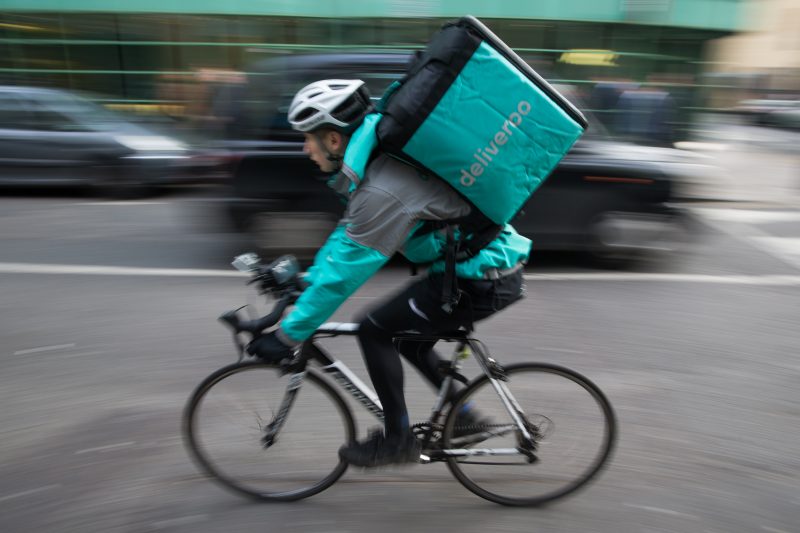Deliveroo on trial in Madrid over workers’ status
Employee or contractor? Food delivery pladforms such as Deliveroo are under pressure over the status of their riders (Daniel LEAL-OLIVAS)
Madrid (AFP) – Online food delivery group Deliveroo went on trial in Madrid on Friday, accused of wrongly hiring more than 500 of its riders as self-employed contractors instead of regular workers, which costs less for the firm.
Brought by Spain’s social security system, which is claiming 1.2 million euros ($1.3 million) in unpaid contributions, the case is one of several being fought by Deliveroo and other gig economy groups like Uber in various countries over whether drivers should be classified as employees.
Online food platforms have bloomed worldwide, allowing people to order from local restaurants via mobile phones, with dishes delivered to their homes or offices shortly afterwards, often by young bicycle couriers.
The trial is expected to end later on Friday, a Madrid court spokesman told AFP, but a verdict is likely to take much longer.
The case originated from a health and safety report ruling that Madrid’s more than 500 Deliveroo riders “were false self-employed contractors, which means they are employees,” said Esther Costa, the lawyer of seven couriers in this case.
Self-employed contractors have to pay their own social contributions to the health and pensions systems.
Employees, meanwhile, have such contributions transferred directly by their employer, which pays a portion of them.
A similar trial took place in February in Valencia concerning the eastern city’s 200 drivers. But a verdict has not yet been reached.
Two other similar trials will take place this year in Barcelona and the northeastern city of Zaragoza.
There have been previous court rulings in Spain over the status of couriers working for Deliveroo or Glovo, another food delivery platform, but these had always been brought by the drivers themselves.
The Madrid case, as well as that of Valencia and the others, “will directly affect the model of labour relations imposed by sharing economy platforms as a whole,” said legal firm Colectivo Ronda to which Costa belongs.
But in a statement, Deliveroo said it “collaborates with self-employed riders… They can choose when and where they work, and for how long.”
“Those who campaign to get rid of flexibility don’t represent the opinion of a majority of riders,” it added.
The company asked for “a legal reform allowing companies to offer self-employed drivers more security without endangering flexibility.”
Disclaimer: Validity of the above story is for 7 Days from original date of publishing. Source: AFP.


